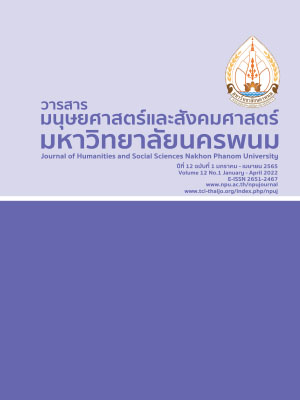Studying the Results of Using the Instructional Model Based on Active Learning Approach and Self-Regulation to Promote Classroom Research Competencies for Thai Language Teacher Students
Main Article Content
Abstract
The objectives of the study were to explore the outcomes of implementing a teaching model that integrated active learning and self-regulation to promote classroom research competencies in Thai language teaching students. The research design was quasi-experimental; One Group Pretest - Posttest design. 1,260 Thai language teacher students of a northeastern teaching institute were the population in this study and 22 samplings were randomly recruited simple random sampling technique. The research tools were included developed teaching model, the classroom research competencies assessment form, and the satisfactory assessment form. The statistical technique for data analysis applied average, standard deviation, percentage, t-test value, and p-value was used to analyze the data. The findings was 1) the teacher students’ post-test of knowledge competency outperformed statistically at .05, their skills competency reached at 84.09 percent and everyone passed the 80 percent criteria, and their attitude score was 4.71 which shows that they satisfied at a very high level. Contributions of the study were 1) the teaching model focusing on promoting classroom research competencies and integrating active learning and self-regulation for Thai language teaching students and 2) guidelines for teachers and other stakeholders in applying the knowledge to develop teaching models integrating active learning and self-regulation to enhance classroom research competencies in other research disciplines.
Article Details

This work is licensed under a Creative Commons Attribution-NonCommercial-NoDerivatives 4.0 International License.
References
Chantarat, W. Atisub, W. Kaosaiyaporn, O. & Robkhob, N. (2020). Phonkānchai rūpbǣp kān nithēt dān
kānwičhai dūai theknōlōyī sārasonthēt phư̄a songsœ̄m khwāmsāmāt nai kān kānwičhai nai chan
rīan khō̜ng khrū sangkat nakngān khēt phư̄nthī kānsưksā prathom sưksā nai čhangwat chāidǣn
phāk tai thī mī tō̜ khwāmrū thaksa læ khwāmphưngphō̜čhai tō̜ kān wičhai nai chan rīan khō̜ng khrū
[Results of the use of research supervision models With information technology To promote the
ability to conduct research in teachers' classroom Under the area office Primary education in the
southern border provinces towards knowledge, skills and satisfaction of teacher classroom
research]. Journal of Education Prince of Songkla University Pattani Campus, Thailand. doi;
Dechakhup, P. & Yindisuk, P. (2018). Thaksa 7C khō̜ng khrū 4.0 [7 C skills for teachers 4.0]. Bangkok:
Chulalongkorn University, Thailand. [in Thai]
Iamsuphasit, S. (1998). Thritsadī læ theknik kān prap phrưttikam . [Theories and techniques of behavior
modification]. (3rd edition). Bangkok: Chulalongkorn University Press, Thailand. [in Thai]
Kaeochaicharœnkit, N. (2019). Botbāt khō̜ng khrū phū sō̜n nai kānčhat kitčhakam læ withīkān patibat tām
nǣothāng khō̜ng Active Learning [The role of the teacher in organizing activities and methods of
implementing the Active Learning guidelines]. Retrieved on 25 July 2019, from
http://www.itie.org, Thailand. [in Thai]
Naksưksa Sakhawichaphasathai. (10 Kumphaphan 2019). Samphat [interview]. Northeastern Teacher
Production Institute, Thailand. [in Thai]
Niyomsup, N. (2017). čhētakhati tō̜ kitkamkān rīanrū bǣp rūammư̄ khō̜ng naksưksā khrū [Attitudes toward
Cooperative Learning Activities of Student Teachers]. Journal of Education, 45(4), 90-108,
Thailand. [in Thai]
Phengsawat, V. (2014). kānwičhai nai chan rīan [Classroom research]. Bangkok: Suveeriyasan Printing
House, Thailand. [in Thai]
Ritjaroon, P. (2001). nǣothāng kānwičhai phư̄a phatthanākān rīanrū botbāt khrū kap kānwičhai nai chan
rīan [Research approaches for learning development, teacher roles and classroom research].
Bangkok: Chili Sweet Graphic. Thailand. [in Thai]
Samnakwichakan and Mattrathankansksa, (2017). Nǣothāng kānčhatkān rīanrū tām laksūt kǣn klāng
kānsưksā naphư̄n thān Phutthasakkarāt sō̜ngphanhārō̜ihāsipʻet [Guidelines for learning
management according to the basic education core curriculum Year 2008]. Bangkok: Printing
House, Agricultural Cooperative Assembly of Thailand, Thailand. [in Thai]
Srisaat, B. (2000). kānwičhai bư̄angton [Preliminary research]. 7th edition. Khangthep: Suveiriyasan.
Thailand. [in Thai]
. (2002). kānwičhai bư̄angton [Preliminary research]. 8th edition. Khangthep: Suveiriyasan.
Thailand. [in Thai]
Sinthapanon, S. (2017). khrū yuk mai kap kānrīanrū sū kānsưksā 4.0 [Modern teachers and learning to
Education 4.0]. Bangkok: Chulalongkorn University, Thailand. [in Thai]
Sisuai, P. and Chunchom, P . (2017). Patčhai thī mī phon tō̜ kāntham wičhai mai lǣo set tām raya wēlā thī
kamnot khō̜ng bukkhalākō̜n khana witthayāsāt prayuk [Factors affecting the completion of the
research by the time specified by the personnel. Faculty of Applied Sciences]. Liberal Arts
Journal Ubon Ratchathani University, 13(1), 173-189, Thailand. [in Thai]
Thai teacher student. (June 10, 2019). Interview. University students in the Northeast. Thailand. [in Thai]
The Secretariat of the Teachers Council of Thailand. (2020). khūmư̄ kān patibat ngānkān tō̜ bai ʻanuyāt
prakō̜p wichāchīp thāngkān sưksā [Practice Guide for Continuing Professional Education License].
Bangkok: Office Secretary General of the Teachers Council of Thailand, Thailand. [in Thai
Watthayu, K. (2005). Kānwičhai phư̄a phatthanā khunnaphāp kānsưksā [Research to improve
educational quality]. Bangkok: Thanaporn Printing, Thailand. [in Thai]
Wikipedia. (2020). Rāi chư̄ Khana Sưksāsāt nai prathēt Thai [List of Faculty of Education in Thailand].
Retrieved on 15 February 2019, from https://www.th.wikipedia.org/wiki, Thailand. [in Thai]
Wongwanich, s. (2018). kānwičhai patibatkān nai chan rīan [Classroom action research]. 15th edition.
Bangkok: Chulalongkorn University, Thailand. [in Thai]
Bandura, A. (1986a). Socail foundations of thought and action : A social cognitive theory. Englewood
Cliffs NJ: Prentice – Hall.
Bonwell, C.C. & Eison, J.A. (1991). Active Learning: Creating Excitement in the Classroom. Washington
D.C.: ERIC Clearinghouse on Higher Education.
Dale, Edgar. (1965). Audio – Visual Methods Teaching. 2d ed. New York: Hot, Rinchart and Winston.
Chuahan, S. (1983). Innovations in Teaching and Learning Processes. 3rd ed. Delhi: Uikas Publishing
House.
Eggen, P.D. & Kauchak, D.P. (2001). Strategies for Teachers : Teaching Content and Thinking Skills.
Boston: Allyn and Bacon.
Joyce, B., Weil, M & Calhoun, E. (2009). Models of Teaching. 8th ed. United States: Pearso Education.
Koul, L. (1984). Methodology Of Educational Research, Vani Education Book, New Delhi.
McClelland, D.C. (1973). Testing for Competence rather than Intelligence. Retrieved November, 26,
, from http://www.ei.haygroup.com
Pintrich & De-Groot. (1990). Understanding and Self-Regulation Learning. San Francisco: Jossey-Bass
Plublishers.
Sherman, S. J., & Sherman. B. S. (2004). Science and Science teaching. Westport: Greenwood Press.


